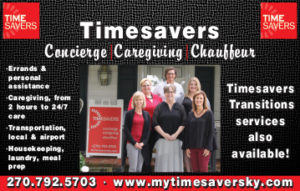
by Elizabeth Downing
The holidays are upon us! You have planned your Christmas shopping list, your holiday card mailing list, possibly a family activity, your travel schedule, and on and on. These are things many of us plan every year. So why is it so difficult to plan in order to be prepared for an emergency or for those detours upon which life can send us?
Every day brings the possibility of change in our lives. Some of these transitions are positive and some not so much. Regardless, we should be prepared for them. What does that mean in practical terms? Ready? Maybe these ideas will get your wheels turning!
If you are over the age of 18, at a minimum you should have a last will and testament, a durable power of attorney, a living will, and a do not resuscitate authorization (if desired).

Think about what will happen if you have a critical health incident or are out of town and have an accident or injury that requires you to be away from home for an extended period. Here are some things you can do to be ready for such an emergency situation.
- Create a list of family members and their contact information.
- Have your financial information stored somewhere accessible to a family member or trusted adviser – credit card numbers and PIN numbers, bank account numbers, names of financial advisers and attorneys.
- Know where your important legal documents, including Social Security cards and insurance cards, are kept and make sure a family member or trusted adviser has access to them.
- Keep a thorough medical history with surgeries, illnesses, hospitalizations, and medications.
- Keep a list of your insurance companies (medical, home, auto), your contacts with the companies, and the policy numbers.
- Record who has extra keys to your home, your car, your office, and any other properties.
- Record alarm codes and passwords.
- Record a list of important contacts – physicians, pastor, closest neighbors, veterinarian, co-workers, members of groups that meet weekly or monthly (bridge clubs, literary clubs, Bible study groups, service organizations).
- Record a list of monthly bills to be paid and designate which are auto-pay and which are paid by check.
- Record a list of memberships, event tickets, and subscriptions and when they come up for renewal.
- Record a list of service providers you trust and use – housekeepers, caregivers, plumbers, electricians, yard services, carpenters, hairdressers, nail technicians.
- Have your estate and funeral plans in order. Planning your funeral is within your control and it will be a celebration of your life, so decide what you want and make sure it is recorded and accessible to family or a trusted adviser. This list can include readings, scriptures, songs, pallbearers, after-funeral plans, and where memorials and/or flowers are to go.
These ideas merely scratch the surface of all of the information we should have collected and organized in order to save our families and friends stress, worry, and time. We protect ourselves by being prepared for all kinds of eventualities. And we protect ourselves by talking to our families about what a family care plan might look like.
The holidays are a perfect time to look at what is going on with health, home upkeep, activities, and other factors, and to then discuss whether it’s time to think about a little help. Having a stranger in your home is a huge transition, and it is easy to resist the idea. Statistically, however, you will remain independent in your home for a longer period of time if you begin to allow some assistance with the things that present safety and/or health risks.
Is cleaning the light fixtures a fall risk? Is changing the filters a respiratory challenge? Does the clutter in the guest room, attic or garage create a fire hazard or risk of tripping? Is driving at night or on the interstate a bigger challenge than it used to be? All of these things can be addressed simply and doing so can enhance your independence rather than hinder it.
When we work with families, we try to facilitate every perspective being heard and considered. This isn’t always easy. What makes it productive, though, is the foundation of preparedness. Realistically, most of us are going to face some kind of health issues in our lives. Whether we are 45 and having knee replacement surgery or 95 and experiencing vision and mobility problems, the answer is the same. Every transition is smoother when we are prepared as much as possible.
We can’t plan ahead with perfect knowledge of what will come, but we can absolutely know how we are going to get from one place to another in life. We hope that journey includes Timesavers. We would be privileged to be a part of your plan.
About the Author:
Elizabeth Downing is Director of Outreach for Timesavers Concierge, Caregiving & Chauffeur in Bowling Green. A 1982 graduate of WKU, Elizabeth is also an attorney, but she found her passion in advocating and providing care for older adults and those with special needs. Elizabeth has written a book entitled Puddles of Perspective, a collection of essays focused on family, female empowerment, and teaching younger generations the value of intergenerational interaction. Elizabeth’s blog, at www.mytimesaversky.com/blog, seeks to raise awareness of issues relating to aging and caring for aging loved ones and to let people know they are not alone in the journey. She has recently completed a Certificate in Care Management from Boston University and facilitates two family caregiver support groups each month.



